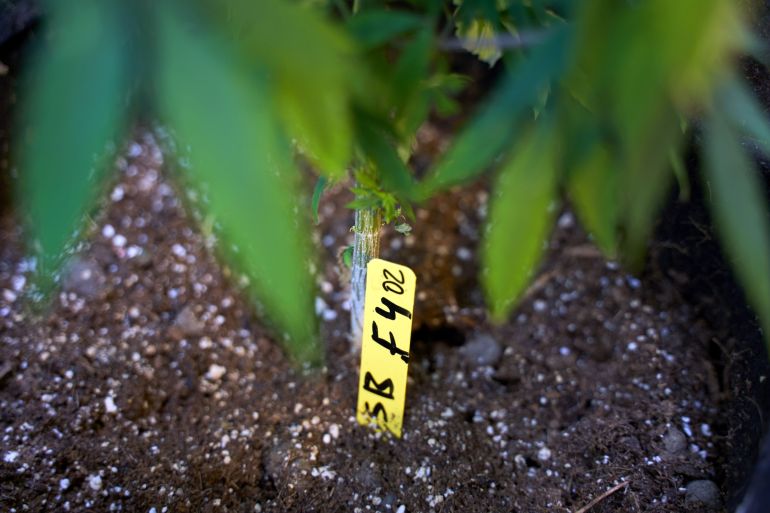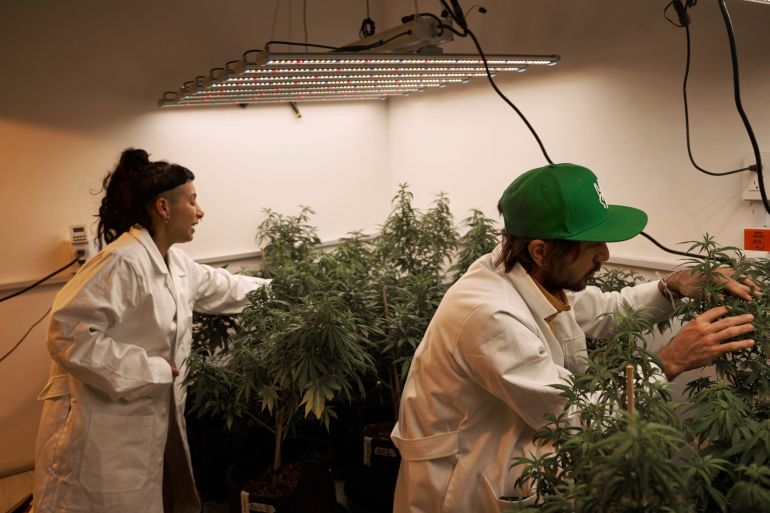How will authorized hashish corporations navigate Mexico’s enterprise dangers? | Enterprise and Economic system Information

Mexico City, Mexico – Legal cannabis is coming to Mexico and many overseas investors are chewing on it.
Mexico is getting closer to full legalization since its Supreme Court ruled in 2018 that banning the drug was unconstitutional. In January, the country’s Ministry of Health put regulations on use for medical purposes.
A bill to legalize recreational use by people over the age of 18 is now in the hands of the Senate of the Republic, which is expected to vote on it this month.
There’s a lot of money to be made: According to an analysis by US consultancy Grand View Research, the medical cannabis market in Mexico alone is expected to reach $ 249.6 million by 2025.
Large global cannabis companies like Canopy Growth, Biomedican, and Aurora Cannabis have been keeping a close eye on legal developments in Mexico to take advantage of a nationwide marketplace once the legalization bill is passed.
Proponents of legalization gathered in Mexico City on July 3, calling on the Senate to approve the measure [File: Ginnette Riquelme/AP Photo]
For Andres Fajardo, president of cannabis multinational Clever Leaves, legal cannabis will have no less than “transformative” effects on Mexico, “creating adequately paid jobs or creating formal employment” while providing new pharmaceutical options for those in need of medical care, said he Al Jazeera.
Proponents of legalization have also claimed that sanctioning the drug will reduce the violence that accompanies drug trafficking.
Cannabis has long been a major product of the Mexican drug cartels, and there is hope that legalizing organized criminal groups will steal income and reduce fighting over territories to grow the plant.
But whether the legalization of cannabis will solve the country’s violence problem remains to be seen, as does the ability of legal cannabis companies to navigate an industry whose illegal nature has historically shaped them through corruption and extortion.
“The legal cannabis industry is likely to face security challenges as cannabis production and subsequent trafficking still represent a large percentage of the revenue of many organized criminal groups,” Eduardo Arcos, a senior analyst at Control Risks, told Al Jazeera.
Dangers of violence and extortion
It cannot be denied that doing business in Mexico carries risks of violence, theft, and corruption. On the Corruption Perception Index 2020 from Transparency International, the country ranks 124th out of 180.
In recent years, foreign mining companies, food distributors and a Coca-Cola distribution plant have closed all operations in Mexico for safety reasons.
A 2018 survey by the American Chamber of Commerce of Mexico that interviewed 415 executives and directors in corporate security departments found that 42.1 percent of respondents said their companies had had attacks on supply chain transportation in the past 12 months have suffered.
The organization’s report (PDF) stated that “virtual blackmail, robbery and threats to employees, trespassing, protests and blockades are considered recurring security problems”.
 Cannabis plants grow in a Cannativa AC research laboratory in Mexico City, Mexico, where proponents of the drug hope the country’s Senate will pass legislation this month to legalize it [File: Maurio Palos/Bloomberg]
Cannabis plants grow in a Cannativa AC research laboratory in Mexico City, Mexico, where proponents of the drug hope the country’s Senate will pass legislation this month to legalize it [File: Maurio Palos/Bloomberg]
Arcos said extortion is a particular concern for companies doing business in Mexico.
“Perpetrators target companies based on their perceived chances of success, forcing companies to respond to their claims, which typically involve one-off or recurring payments,” he told Al Jazeera.
Coercion sometimes includes the threat or act of armed violence, kidnapping, and theft or robbery of machinery in order to obtain payment from the victim for “protecting” the perpetrator.
“The focus of extortion is protection, not necessarily violence,” Maria Teresa Martinez Trujillo, professor and researcher at Monterrey Technological College, told Al Jazeera. “In the workplace, someone offers you protection from a threat they represent. So the source of protection and threat is the same. “
The latest data from the annual survey of 33,866 white-collar crime victims by the Mexican National Bureau of Statistics shows the extent of the blackmail problem. Roughly 688 out of 10,000 companies reported as victims of extortion are the third most common criminal company after employee theft and theft or damage to goods, money, merchandise, or other business inputs.
Arcos noted that “companies operating in remote locations with little law enforcement presence, such as mining, energy and construction companies, are often targets of extortion by organized criminal groups”.
Remote cannabis farms could fit that bill, leaving them vulnerable to criminal groups who “have extensive control over economic activities in a given region and have the ability to significantly disrupt their operations,” he said.
Arcos added that the burgeoning legal cannabis industry in Mexico should therefore be careful.
“Security threats to the legal cannabis industry will likely include threats of violence from organized crime, extorted concessions in exchange for permission to operate in criminally controlled areas, and threats of personnel kidnapping,” he said. “Other security threats are likely along the product supply chain, including distribution channels.”
Risk reduction
So how could business ventures linked to a new legal cannabis industry face violence and blackmail?
Clever Leaves hopes its experience with Mexico’s southern neighbor, Colombia, will help. Colombia legalized medical cannabis in 2016 and has its own history of problems with drug trafficking and organized criminal groups.
Fajardo, CEO and co-founder of Clever Leaves, said he felt choosing the right place to grow cannabis legally is critical.
 Entrepreneurs like the co-founders of Cannativa AC hope to benefit from legalization once it is allowed in Mexico [File: Maurio Palos/Bloomberg]
Entrepreneurs like the co-founders of Cannativa AC hope to benefit from legalization once it is allowed in Mexico [File: Maurio Palos/Bloomberg]
“We have chosen our locations within Colombia in regions that not only have the right agro-industrial characteristics in terms of weather, humidity, sun, solar radiation, etc.” he explained.
Fajardo said the company chose to grow its crops in parts of Colombia where there has been minimal violence in recent years and hired a private investigation firm to get information on land ownership to make sure there was no conflict .
“There were no deaths in the region where we operate a cultivation facility [by homicide] per 100,000 people over the past 15 years, ”he said.
The facility is located in the central Colombian department of Boyaca – where, as Fajardo also pointed out, there is a Colombian army base nearby.
Local partners
Fajardo also said strong local partnerships are essential to building a viable legal business.
Clever Leaves recently entered the Mexican market as a partner of the local company CBD Life and supplies the wellness company with pharmaceutical cannabis for its consumer products such as lotions and drinks that contain cannabidiol (CBD, a chemical compound found in cannabis and has been proven in studies Relieve pain and address symptoms of mood disorders).
In Mexico, like everywhere else, Fajardo said, the company needs a local person “who knows the market, who better understands the regulator, who can better manage the market.”
Luis Armendariz, a cross-border commercial lawyer specializing in the Mexican cannabis industry, said that is exactly what he advises his clients to do.
Armendariz said, “It is a reality and an indisputable fact that there are criminal threats or even extortion or corruption” when doing business of any kind in Mexico.
“But you can find good local partners, for example, who can guide and represent you and bridge the gap between government and the way Mexican culture works.”
“These local partners can be anyone from employees or managers to joint venture partners,” he added. “In my opinion, if you can find a good local partner, that is one way of reducing the risk.”
